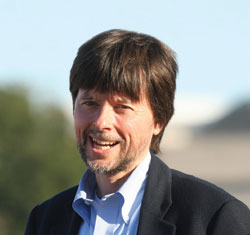Preserving the Primeval
In 2009, documentary filmmaker Ken Burns produced a six-episode tribute, The National Parks: America’s Best Idea, with Dayton Duncan. Despite being filmed at some of nature’s most spectacular locales — from Acadia to Yosemite, Yellowstone to the Grand Canyon, the Everglades of Florida to the Gates of the Arctic in Alaska — it is primarily a story of people: those who devoted themselves to saving a precious portion of the land they loved. At its heart, says Burns, the project is a story about the meaning of democracy.
We had the opportunity to interview Burns at the time of the film’s release. Following is a selection of Burns’ comments from that conversation:
The night before: “I didn’t sleep well the night before we started filming, and as I lay awake, I remembered a moment when I was 6 years old and my mother was dying of cancer. My father was absent in every sense of the word. But there was this day he took me to his house after school. He woke me up in the middle of the night and we drove to Shenandoah National Park at the top of Skyline Drive in the Blue Ridge mountains. That was the first and only road trip I ever took with him, and that was my first visit to a national park. Dad died while we were filming for this series in Yosemite.”

Land for all to share: “For the first time in all of human history, land was set aside for everyone; not for kings or noblemen or the rich but for everyone. This is a story of how people from every conceivable background — rich and poor; famous and unknown; soldiers and scientists; natives and newcomers; idealists, artists, and entrepreneurs — struggled against those forces of development, those inquisitive and extractive forces that are always with us, that want to dam a river, that want to cut down a stand of trees, that want to mine a canyon. The national parks are the fruit of that desire to save some glimpse, some portion of the primeval existence, so that we would be able to remind ourselves how lucky we were to fall upon this beautiful Garden of Eden of a continent.”
A good problem: “The parks today get 275-million-plus visitations. After The Civil War [Burns’ acclaimed 1990 series] aired, visits increased dramatically at Gettysburg. The superintendent and I were walking toward the visitors’ center and he stooped down, picked up a candy wrapper, waved it in my face and said, ‘It’s all your fault.’ I hope that every park superintendent will be angry at us for drawing new visitors, even if there are traffic jams in Yellowstone, Yosemite, and the Grand Canyon. That’s a good problem to have. The worst thing is when nobody is coming. When nobody cares. The parks need every generation coming back and remembering how wonderful they are.”
Unspoiled places: “I’ll always remember the unexpected emotion I felt seeing our country at its best in unspoiled places. Looking at a river and not seeing a dam, walking through a stand of timber and not thinking about board feet, standing in a canyon and not caring about how much mineral wealth could be extracted. But there’s another part of that feeling. When you’re standing on the rim of the Grand Canyon looking down and seeing the Colorado River flow through rock that’s 1.7 billion years old, it matters very much who is holding your hand. Who you’ve made that trip with just as I did to Shenandoah National Park so many years ago. Could there be a better reason for saving these beautiful places?”